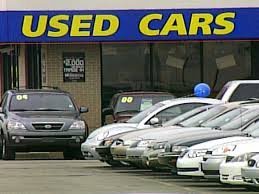10 Top Tips for Buying 'Used'

'Waste less money'
Accoring to Ruppert, following his guide will lead to "slashed running costs, depreciation no longer becomes an issue and there are no finance charges."
Ruppert said: “Bangernomics makes you feel good about owning a car. In fact, you will have a warm green glow from recycling a used car, prolonging its life and, we hope, seeing a slightly larger balance on your bank account. Not only is Bangernomics easy, it is mostly fun.
"You learn some skills, waste less money and have a new topic of dinner-party conversation."
Step One: Get Bangernomics senses.
Use your eyes, ears and nose to check the car’s vital signs. Does the engine sound ropey? Can you smell oil?
Step Two: Condition is key
There is no excuse for buying an un-roadworthy heap. How does the bodywork look?
Step Three: Under the bonnet
Take a look and take a mate or vehicle expert with you to get a valuable second opinion on the car.
Step Four: Around the body
Check that the doors, windows, bonnet and boot open and close, and don’t be afraid to walk away if the car looks rust riddled.
Step Five: Tyres
Check they have a legal depth of tread, even wear across the tyre and no serious blemishes or damage.
Step Six: Paperrwork
The registration document is an absolute must. Obtain a data check to make sure it isn’t stolen, still on finance or a write-off.
Step Seven: Start the engine
Check that the vehicle starts cleanly and that there is no smoke billowing from the exhaust.
Step Eight: Play with the buttons
Prod and press all the knobs, dials and handles to make sure they work properly.
Step Nine: Test drive
Engage the gears and pull sharply away. You don’t want to hear crashes, bangs, screeches or whines or feel a saggy suspension.
Step Ten: After the drive
Look under the bonnet with the engine running – check for leaks, smoke or strange noises.
Make your car last longer
Spending a few minutes checking, cleaning and fussing over your car each week will make a big difference. After a few weeks you will notice the difference; it will perform better, last longer and be cheaper to run.
Check and change your oil regularly. Oil is the life blood of your car, providing vital lubrication, so look at the dipstick before every journey and make sure it nudges the maximum mark. Change your oil regularly, especially if you only cover short journeys - at least every six months.
Check your brake fluid and water. You will soon notice if there are sudden drops and a garage can identify any problem and prevent further - possibly major - damage.
Look to see if there are any fluid leaks from hoses or any loose belts. If you hear any strange noises, investigate before a minor fault becomes a major expense. Of course, regular servicing is a must and so is bodywork hygiene. Cleaning keeps corrosion at bay and also means you inspect every area of the car carefully.


